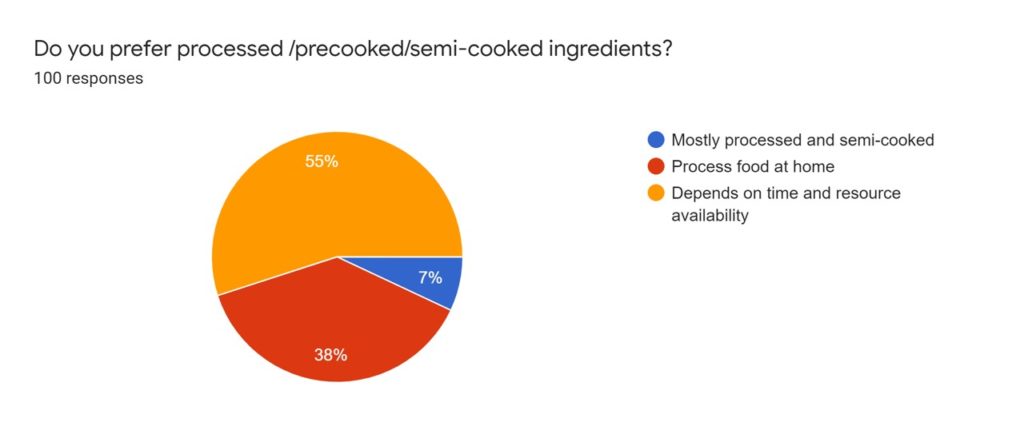
As per our survey results, most of our respondents prefer home-cooked food over ready to eat meals. However, many respondents prefer processed (ready to eat) or semi-processed (ready to cook)foods depending on time and resource availability. To help us make informed decisions about sustainable cooking, I have collated some factual information about ready to eat and ready to cook (processed and semi-processed foods).
Today most of our kitchens have at least 20% to 25% of processed or semi-processed cooking ingredients such as salt, sugar, tea, coffee, flours, soup mixes, spice powders, oils, etc. We also include few ready mixes which are categorized as ready to cook (RTC) food items. Ready to cook (RTC) food items are those that we process further -roast, bake, fry, etc. The share of ready to eat(RTE) food items is currently around 5% to 15% in our homes. These include cookies, most snack items, canned juices, jams, pickles, bread, pre-cooked millets, rice, etc. We can also include the food ordered via food delivery apps to the RTE list.
The percentage of RTC and RTE inclusion in our diets is increasing at a steady rate globally. This increase is linked to a growing number of the working population, time constraints, reduction of space for kitchen gardens, travel, choice of global cuisines, etc. We cannot avoid the RTC and RTE completely from our diets unless we want to limit the food items to only those which we can completely process in our kitchens and/or grow in our kitchen gardens.
While most of us cannot completely avoid the RTC and RTE foods, we can make informed choices to address nutrition concerns. The following resources and points might be helpful to make sustainable cooking decisions:
- Food Labeling: Educating consumers to make a correct interpretation of food labeling is of utmost importance to make healthy food choices. Governments and food processing companies eg. Unilever, Subway, etc. have published food labeling guidelines to educate producers and consumers (FSSAI food labeling guidelines). The Food and Agriculture Organisation has published a study about innovations in food labeling which include aspects like geographic origin, allergenic history for certain regions, eco-footprint, etc.
- Awareness about health impacts: It is an established fact that overconsumption of ready to eat foods that are ultra-processed will definitely lead to chronic diseases. Hence, it is important to consume food as per the nutritional requirements. It is useful to get regular health check-ups and consult certified nutritionists, as well as follow traditional and regional food wisdom to limit the negative health impacts of processed and ready to eat foods.
- Consciousness: Awareness about food labels, nutrition requirements, and traditional food wisdom help us make informed food choices. However, due to impressive marketing, time constraints, lifestyle changes, etc. might hinder our consciousness about making apt cooking choices. Building consciousness constantly by budgeting food requirements, joining local food groups, sharing and donating food, cooking fresh meals, and carrying fruits and food while traveling will us cook sustainably.
In the next article, we will consider the importance of the selection of fuels and cookstoves and the impact of temperature on sustainable cooking.
Enjoy Cooking!


Itís nearly impossible to find knowledgeable people in this particular topic, but you sound like you know what youíre talking about! Thanks
Right away I am going to do my breakfast, after having my breakfast coming again to read further news.